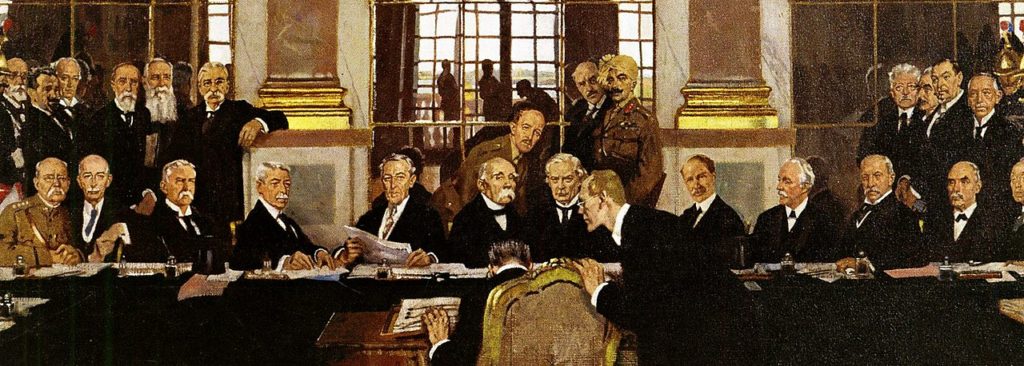The third chapter of Simms’ book is entitled ‘The Colonisation of Germany’ and begins with these words:
The immediate post-war years were a period of national disgrace for Germany. Its monarchy banished, shorn of large tracts of territory by the Versailles settlement and saddled with a huge reparations bill, the Reich was plunged into profound economic, political and psychological dislocation. Foreign soldiers, some of them of colour, occupied substantial parts of the country. Germany had fought the world and lost; now many felt she was a colony of the global system.
The very biological substance of the German people seemed to be at stake, as they grappled with the continuing blockade and then the prospect of long-term immiseration. Hitler experienced these travails both personally and politically. His own situation was even more marginal than most. He found his way through the turbulent aftermath of the war with difficulty. Hitler was also even more exercised than most Germans about the state of the Reich. He looked for answers, and he soon found them.
Hitler identified the root cause of Germany’s humiliation as the power of the Anglo-American and Jewish international capitalism, which used various instruments, in particular revolutionary communism, to keep the Reich in subjection. With the help of others, but essentially under his own steam, Hitler began to develop an ideology to make sense of the world around him. By the end of this period, Hitler had undertaken a comprehensive diagnosis of the Reich’s ills, though he had yet to suggest a cure. Given the depths to which Germany had fallen, Hitler expected the national revival would take generations.
Shortly after the war ended, Hitler was discharged from hospital. Then according to Simms came three decisive events. First, Hitler was chosen by his commanders to serve in the propaganda and education section of the army, headed by Captain Karl Mayr. This indicated, according to the author of Hitler, an understanding that he had an aptitude for such work. Secondly, Hitler was elected Vertrauensmann—a person to be trusted—by the High Command, which shows that he had by then won the support of a section of his comrades. The third event was the news of the humiliating conditions of the Treaty of Versailles at the end of June 1919.
 German delegate Johannes Bell signing the Treaty of Versailles in the Hall of
German delegate Johannes Bell signing the Treaty of Versailles in the Hall of
Mirrors, with various Allied delegations sitting and standing in front of him.
The following month Hitler took part in a debate in his Reichswehr unit; three days later he delivered a speech on the peace terms. Simms informs us that this was Hitler’s first major political statement on record. Although the text hasn’t survived, the content can be deduced from comments on it. The next day Hitler spoke on the subject of ’emigration’. Two days later, a Reichswehr report states that Hitler had given ‘a very good, clear and spirited lecture on capitalism during which he touched, indeed he had to touch, the Jewish question’.
Simms comments that this was Hitler’s first recorded reference to Jews, adding that it was made in the context of capitalism, not Bolshevism.
4 replies on “Hitler, 4”
Of all the countries that betrayed Germany, I am most confused by the cold shoulder that was given to Germany by her Nordic brother nations (The Netherlands, Denmark, Norway, Sweden). What can you tell me about it, César? Was it Christian ethics again, or were there Jewish emissaries whispering into the ears of Nordic heads of state?
Also, will you be responding to my Charles Dickens comment? I would like to know.
Sorry: I don’t have the time.
One question…
In order to weed out christianity, first you have to make your population healthy physically and morally, but the jews are behind of preventing that.
Could Hitler have tackled the Christian question before jews?
I’m thinking that he couldn’t have attacked (passively and an adequate speed) christianity without kicking out jews first.
That’s like trying to cure an infection before taking the tick off.
That’s not the way I read the history of the country in which I was born, where Jews had no power (New Spaniards corrupted their blood sans the help of the Jews).